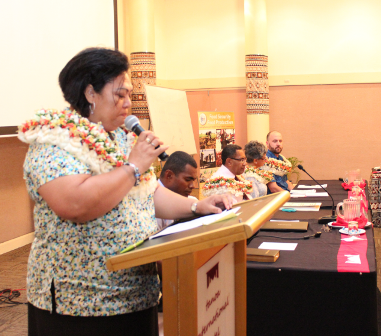
Climate Change Resilience
Stakeholders from the 14 Pacific island countries participating in the Pacific Adaptation to Climate Change (PACC) project have gathered in Nadi, Fiji this week for the project's fourth annual review meeting. The four-day meeting was opened on Tuesday 13 August by Fiji's Permanent Secretary for Agriculture, Mr Ropate Ligairi. Welcoming addresses were given by representatives of SPREP, UNDP and AusAID.
The PACC project is the Pacific region's most extensive climate change adaptation initiative. During the meeting, participants will hear about progress in the 14 demonstration projects, as well as achievements in mainstreaming climate change within the countries.
As the project moves into its final 18 months, the meeting focus will be on sharing best practices and lessons learned, and developing strategies for up-scaling and ensuring sustainability.
"This meeting is a great opportunity to share experiences and showcase achievements," said Regional Project Coordinator, Taito Nakalevu. "We will also be working to strengthen some key areas that are vital for long-term success of the project, notably gender integration and knowledge management."
A gender training session preceded the meeting, and reinforced the importance of taking into account the different vulnerabilities and different skills and knowledge of men and women with regards to climate change and coping strategies. Practical steps were also taken to integrate gender into the project, for example by developing gender-sensitive indicators for monitoring and evaluating progress.
The PACC project is a partnership between several key regional agencies and national agencies and communities in 14 Pacific island countries. It is funded by the Global Environment Facility (GEF) and the Australian Government (AusAID), with the United Nations Development Programme (UNDP) as its implementing agency and the Secretariat of the Pacific Regional Environment Programme (SPREP) as implementing partner.
The PACC project is the Pacific region's most extensive climate change adaptation initiative. During the meeting, participants will hear about progress in the 14 demonstration projects, as well as achievements in mainstreaming climate change within the countries.

SPREP's Director for Climate Change, Dr Netatua Pelesikoti, at the opening of the review meeting
The PACC project is laying the groundwork for more resilient Pacific communities that are better able to cope with climate variability today and long term changes. The 14 country projects are demonstrating best-practice adaptation in three key climate-sensitive areas – coastal zone management, food security and food production, and water resources management.As the project moves into its final 18 months, the meeting focus will be on sharing best practices and lessons learned, and developing strategies for up-scaling and ensuring sustainability.
"This meeting is a great opportunity to share experiences and showcase achievements," said Regional Project Coordinator, Taito Nakalevu. "We will also be working to strengthen some key areas that are vital for long-term success of the project, notably gender integration and knowledge management."
A gender training session preceded the meeting, and reinforced the importance of taking into account the different vulnerabilities and different skills and knowledge of men and women with regards to climate change and coping strategies. Practical steps were also taken to integrate gender into the project, for example by developing gender-sensitive indicators for monitoring and evaluating progress.
The PACC project is a partnership between several key regional agencies and national agencies and communities in 14 Pacific island countries. It is funded by the Global Environment Facility (GEF) and the Australian Government (AusAID), with the United Nations Development Programme (UNDP) as its implementing agency and the Secretariat of the Pacific Regional Environment Programme (SPREP) as implementing partner.